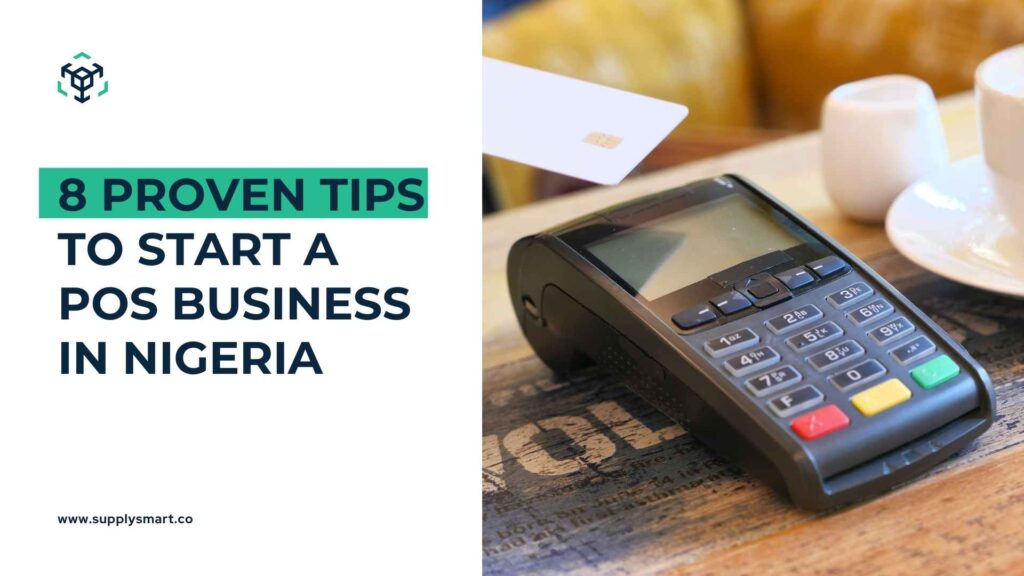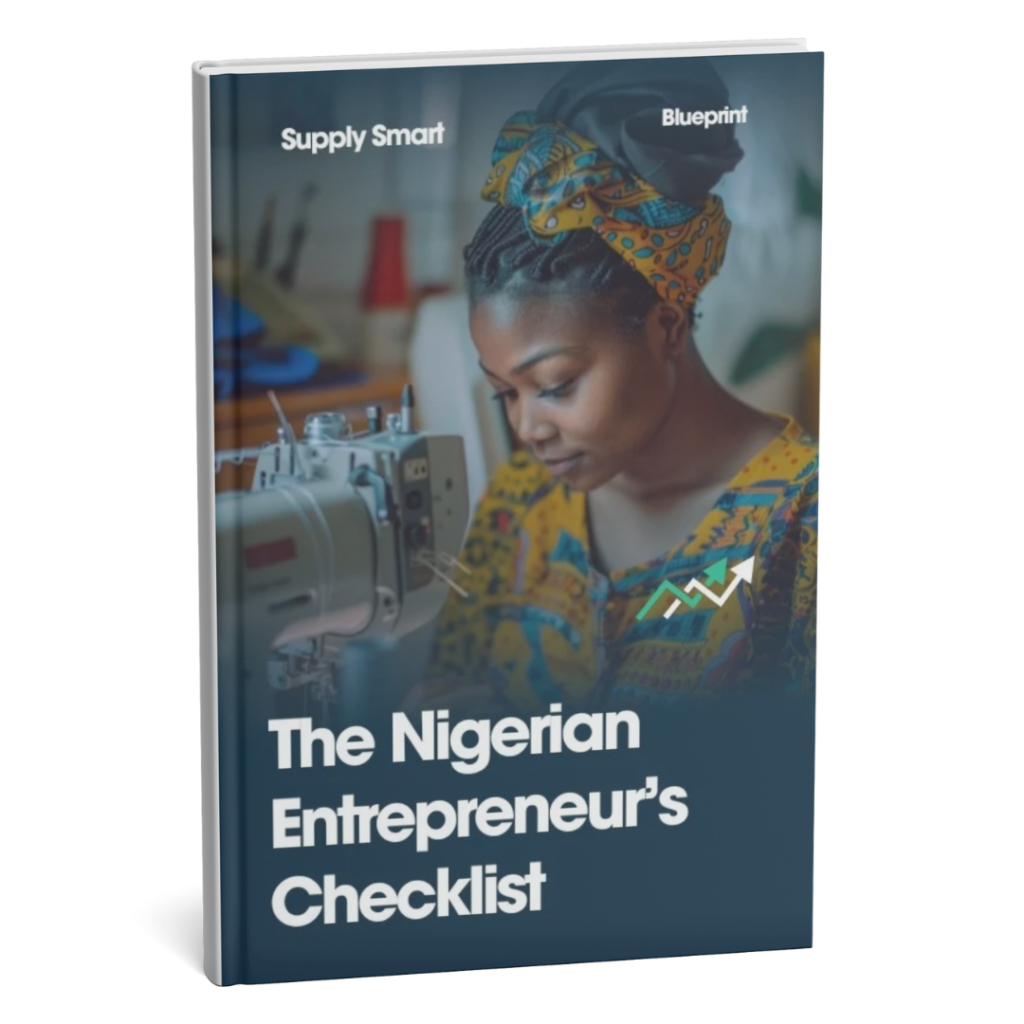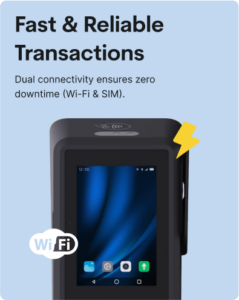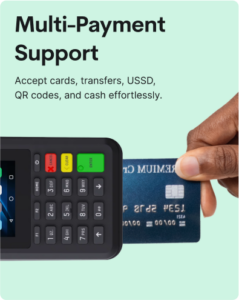In most parts of Nigeria, what’s faster than heading to the bank?
Asking “Where the next POS dey?”
The kiosk at the junction, the woman under the umbrella near Mama Dami’s shop, the guy with a branded POS banner sitting behind a small table, they’re the real backbone of everyday banking.
They make withdrawals possible at 6:40 a.m. For many Nigerians, especially outside city centres, POS agents are the bank.
The Nigeria Inter-Bank Settlement System (NIBSS) reports that Nigerians spent ₦18 trillion via POS terminals in 2024 – a 69% leap from ₦10.7 trillion in 2023 – with transaction volume hitting 1.5 billion, up 8% year-on-year.
Statista also forecasts that the mobile POS market could reach US$42.68 billion by 2025.
So yes, the POS business can be profitable. But only if you start it well, run it smart, and understand the terrain.
This guide is here to show you exactly how, the real step-by-step path to starting a profitable POS business in today’s Nigeria.
Let’s begin.
What Is a POS Business?
A POS business is a service where you help people carry out basic financial transactions, right in their neighbourhood, using a small device called a POS terminal.
These include:
- Cash withdrawals
- Deposits
- Bank transfers
- Airtime/data recharges
- TV and utility bill payments
- Wallet top-ups (like Bet9ja, Opay, etc.)
It might look simple from the outside, but don’t be deceived, behind that device is persistence, float management, high foot traffic and sharp customer care instincts.
How the POS Business Works (Before You Start)
If you’re asking, “How does a POS business actually work?”, you’re not alone.
Many people see agents doing their thing on the roadside and assume it’s just about ‘getting a machine’ and collecting ₦100 per withdrawal.
But behind every functioning POS setup is a real business model, with cash flow management, strategic planning, customer behaviour, and risk handling involved.
Let’s break it down.
1. You Operate as an Official Banking Agent
You don’t just become a POS agent randomly. You work under the umbrella of a licensed bank or fintech aggregator. These entities extend part of their financial infrastructure to you.
You essentially act as a micro-branch, handling daily transactions on their behalf, and that agreement is what makes the business legitimate.
Examples of providers:
- Banks like FirstMonie (FirstBank), Access CLOSA
- Fintechs like Supply Smart, Moniepoint, OPay, PalmPay, etc.
2. You’re Provided with a POS Terminal
Your provider gives or sells you a payment terminal. Some:
- Lease the device (with a caution fee)
- Sell it outright
- Require a minimum monthly transaction target to keep using it
The device connects to the bank’s system using a SIM card (MTN, Airtel, etc.).
There are two types:
- Mobile POS (mPOS) – smaller, works with apps and phones.
- Traditional POS – bigger, standalone terminals that print receipts.
3. You Front the Cash (a.k.a. Float)
The business doesn’t run without money. You use your cash to:
- Fund cash withdrawals
- Process transfers
- Top up wallets
This upfront capital is known as your float.
If your float is wiped out by early morning withdrawals, you’re done until you refill it via transfer or bank deposit.
Think of it like stocking up a shop, when your shelves are empty, you can’t sell.
4. You Make Money Through Transaction Margins
Here’s the real business model:
- The customer pays you a service fee
Example: ₦100 for withdrawals or ₦50 for transfers - You process it via the provider terminal
- You get a commission
Often between ₦10 – ₦20, depending on provider - Your profit = Customer fee – Provider charges
This means the more people you serve, the more you earn. Volume = Profit.
That’s why busy locations matter, and good customer service leads to repeat business.

5. You Can Offer Extra Bill Payment Services
Most providers now allow agents to process:
- DSTV/GOtv subscriptions
- PHCN/NEPA payments
- WAEC pins
- Betting wallet top-ups (e.g. Bet9ja)
- Airtime & data sales
Each of these comes with small commissions or service charges, extra income on top of cash transactions.
You might want to check out my article on smart services you can add to your POS business.
6. Settlement & Dashboards = Your Back Office
All providers give you a backend dashboard or mobile app:
- View all transactions
- Reconcile issues
- Track incoming float
- Monitor earnings
Some are instant settlements, while others take a few hours to credit your wallet after each transaction.
This system is how you track your business in real time, just like a banker in a branch would.
7. But It’s Not Just Tools, It’s Trust + Management
What people don’t realize: POS is not all “just press POS and collect money.”
You’ll deal with:
- Impatient customers
- Fraud risk (fake alerts, reversals, false complaints)
- Network downtime
- Capital constraints
- Service recovery
Every day, agents juggle customer service with real money handling. It’s a business of both math and people.
Now that you understand clearly how the POS business works at a deeper level, the next big step is putting the right structure in place.
Let’s go into the 7 practical steps to help you start a profitable POS business in Nigeria from the ground up.
Step-by-Step: How to Start a POS Business in Nigeria
Step 1: Know What You’re Getting Into
Starting a POS business sounds easy – “just buy a device and start”!
But you’ll quickly learn that it’s:
- Highly cash-reliant
- Location-dependent
- A business of trust, awareness, and quick thinking
It’s not a plug-and-play hustle. The sooner you treat it like a full business, the better your results.
Step 2: Choose and Register With a Provider
You need an agency banking partner. Top ones in Nigeria today include:
- Supply Smart
- Moniepoint
- OPay
- PalmPay
- FirstMonie (First Bank)
Research their:
- Customer support
- Downtime history
- Charges
- POS terminal availability
- App/dashboards (many are app-first and friendly)

Step 3: Get Your POS Terminal the Right Way
Ask smart questions before you collect a POS terminal:
- Is it a fixed or mobile POS?
- Does it support multiple SIMs (in case MTN or Airtel fails)?
- What’s your transaction cap per day?
- Is there a deposit security (caution fee)?
Common costs range between ₦20,000 – ₦120,000, depending on provider, device, and deal.
Step 4: Secure Working Float (Your Running Capital)
This is where most people fall short. Without float, you can’t serve customers, especially after early morning withdrawals wipe your balance.
Best practice:
- Start with at least ₦100,000+ if you want daily breathing room.
- Refill it as needed, especially on Fridays when Nigerians love to withdraw cash “for the weekend.”
Step 5: Choose a High-Traffic Location
Location makes your business.
Ideal spots include:
- Near busy streets or T-junctions
- Around bus parks
- Next to markets or betting shops
- Inside phone/accessory stores
- Areas with no bank or ATM in sight
Visibility matters; signage, branded umbrellas, and POS banners can help.
Step 6: Train Yourself (or Staff) Properly
You (or your staff) must know how to operate a POS.
Here are the basics you need to at need to know:
- Confirm transfers before handing out cash
- Avoid fraud (no fake alerts)
- Handle reversal issues
- Open/close properly
- Use mobile dashboards to check settlements
Most good fintech dashboards now support plain-English steps, so no “tech” skills needed. It’s all explained simply in the tools.
Step 7: Add More Ways to Make Money (Smart Move)
Every transaction is money, but not every transaction is a cash withdrawal.
Add:
- Airtime & data top-ups
- DSTV, GOtv, Startimes
- PHCN bill payments
You know what? I have a full article on smart services you can add to your POS business; you should check it out.
Common Challenges You’ll Face in the POS Business
Let’s not sugarcoat it. Here’s what you need to be ready for:
1. Network wahala
You’ll deal with failed transactions due to bad signal or congested provider networks.
Get a POS that auto-switches between SIMs (MTN, Airtel, Glo). OR you can also get a Supply Smart POS with unlimited data.
2. Disputed transactions
Money leaves customer account, but you didn’t get it, or vice versa.
Train to never release cash until confirmed, and use providers that help you settle fast.
3. Low float due to poor cash management
You start strong, but within a day, you’re out of cash to serve people.
Analyze your busiest periods and adjust your float forecast weekly. Some dashboards even help you visualize this.
4. Competition
If you’re in Lagos or Port Harcourt, you might be on a street with 8 other agents.
Focus on trust, speed, and friendly service. Many people come back for how they’re served, not just where.
Frequently Asked Questions (FAQs)
Q: How much does it cost to start a POS business?
A: Costs can vary depending on the scale of your operation.
Generally, initial investments per device might range from ₦100,000 to ₦300,000 or more. It’s a good idea to shop around, compare suppliers, and factor in any additional fees like regulatory charges to get a clear picture.
Q: How do POS agents get paid?
A: POS agents typically earn their income through commissions on every transaction processed via their devices. These commissions are usually paid by banks or payment aggregators as a reward for broadening the electronic payment network.
Q: How much is the commission for POS?
A: POS commission rates often fall between 1-3% of the transaction value. However, these numbers can change based on your agreement with the bank, the transaction volume, or any special incentives available at the time.
Always check the latest terms with your partner to stay updated.
Q: Which bank is best for a POS business in Nigeria?
A: The top banks which are best for your POS business in Nigeria are FirstMonie (First Bank), Access CLOSA
However, most people prefer fintechs for less paperwork, ease of use, and faster payout. Moniepoint, Opay, and PalmPay are the top 3 choices right now.
Final Thoughts: It’s More Than “Just POS”
In a country like Nigeria, where banks sometimes disappoint and ATMs run out of cash by 7 a.m., POS agents are community heroes.
Done right, this business can:
- Build your brand
- Fund your bigger dreams
- Employ others along the way
If you’re trying to escape joblessness or turn your hustle into scalable income, the POS business is one of the few low-barrier options that works.
Start well. Start smart.




